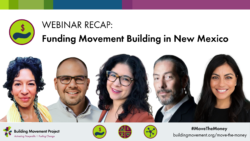Apr
22
2022
Quick Access: Recording, Transcript, Move the Money Resources
On April 14th, 2022, the Building Movement Project hosted a conversation with philanthropy and movement leaders based in New Mexico to discuss the challenges, opportunities, and successes of funding social movements. The conversation was anchored by a set of resources that BMP released in 2021 called “Move The Money: Practices and Values for Funding Social Movements,” which is aimed at grantmaking institutions eager to expand and deepen their support of organizations, networks, and leaders involved with social change movements.
BMP Consultant Alicia Lueras Maldonado moderated a panel discussion with Adrián Pedroza (Abriendo Puertas/Opening Doors), Gabrielle Uballez (Asset Funders Network), Henry Rael (McCune Charitable Foundation), and Marisa Magallanez (Albuquerque Community Foundation). During the 90-minute webinar, the speakers unpacked the role of philanthropy in supporting social change movements on a national scale, and emphasized how movement leaders and funders in New Mexico work with and within grantmaking institutions to expand and deepen their support of organizations, networks, and movement leaders. They explored the power dynamics between grantmakers and their grantees, the opportunities to shift the culture of philanthropy, their bold solutions for movement building in New Mexico, and more.
Check out the highlights from the discussion below and watch the recording above.
Adrian Pedroza on the value of a “quick no” and a “quick yes” in funding conversations:
It’s important to have a “quick no.” There’s nothing more frustrating – on the community side – than to be dragged along in a process, doing a year or two years of due diligence, relationship building, and understanding. Then get a delayed “no” when early on there was an idea that the funding wasn’t going to happen.
We understand that it might not be a good match and that’s okay. As a leader of nonprofits, having done this work over the years, I’d much rather know upfront that it’s not a funding priority. We appreciate the “quick no,” and we also appreciate the “quick yes.” I think this panel is a model for how we can ensure that foundations are influencing each other to really fund the work that is needed to shift systems.
Gabrielle Uballez on the importance of funders taking risks and leveraging their financial power:
Risk taking is one of the challenges that I’ve seen in the sector. I think redefining risk is one of the biggest things [funders] can do. I’ve seen quite a bit of hesitancy to get [movement building] work started and learn as we go, rather than to have it perfect. I would say jump into it.
There is this idea of five elements of power building: people power, narrative power, relationship power, governance power, and financial power. I think philanthropy really needs to understand what its lane is and then stay in that lane as much as we can. We have a lot of power with money. That’s the financial power piece, but there is also the narrative power piece. How can funders not perpetuate a scarcity mentality? Not just between groups of color, but even between white folks who are disenfranchised by the same systems that are oppressing Black and Brown people. How do we start to shift that narrative, while also centering POC leadership and relinquishing power? I think it’s complex, but I see that it’s happening in New Mexico in a really authentic and heart-centered way.
Henry Rael on changing the culture of philanthropy and moving the money:
When there is a crisis, philanthropy is good at moving money fast to the extent that it does. But when it’s about systems change, philanthropy is not good at doing that. There are foundations which comprise a certain percentage of philanthropy, which I think is a pretty small percentage, that are aligned with systems change work and can move money fast. But if you think of the full scope of philanthropy, we’re not going to move that fast. Consider that, for example, a private family foundation is only legally obligated to disperse 5% of its endowment every year. That is such a tiny amount to be putting out. Think about what kind of change could happen if we are able to put out more of that. So, when you think about the scope of the change that has to happen in philanthropy for it to be nimble and agile, and to quickly move money to social change work, it’s a huge heavy lift. From my perspective, it’s about culture change and it’s about really pushing hard to make a difference in the longer term.
Marisa Magallanez on the internal work that a foundation must undertake to be transformational and support staff of color:
How do we go from transactional relationships to transformational relationships? We’re thinking about how to come into the work with deep care and concern for how this community foundation can serve its community. I think a key piece is the internal work. We can do all the external work we want, but I feel like the foundation of cultural work is done inside, being values aligned, and making sure that everybody on our staff knows that we are working to dismantle systems of oppression. That needs to be at the top of the agenda and involves working with our board. Along with re-imagining how our work looks out in the community, it’s also about centering the deep cultural work that is happening within our organization, both at the staff and the board level. How do we create environments where people can speak their full truth, and feel supported? Not feel like they’re going to be fired in the next week because a board member didn’t like what they were saying. That’s a real situation. When [people of color] are coming into historically white organizations, and a historically white sector, we have to hold on deeply and tightly to each other and build those communities to support each other not only within our organization, but within our sector.

